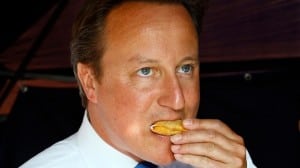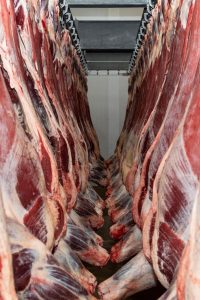BBC News

The labelling of ritually-slaughtered meat is a matter for retailers, customers and faith groups, the prime minister’s spokesman has said.
His comments came after it emerged some meat was being sold which could qualify as halal but was not labelled as such.
Retailers say the animals are stunned before slaughter and the only difference from standard meat is that they are blessed as they are killed.
Faith leaders have called for clearer information about slaughter methods.
‘Consumer choice’
Islamic law states that the animal must be uninjured before slaughter but some authorities allow a form of stunning.
Five leading UK supermarkets have defended selling meat that could qualify as halal, due to the method of slaughter or the use of a blessing as the animal was killed, without informing consumers. They all said the animals were stunned before slaughter.
David Cameron’s spokesman said the prime minister believed this was “an issue of consumer choice and consumer information”.
He said: “So it is a matter for retailers and restaurants to work with customers and consumer groups and representatives of faith organisations.
“He is a strong supporter of religious freedoms, including religious slaughter practices.”
The spokesman added: “I don’t think the PM has concerns about the meat that he buys. He very much understands why some people have concerns about the information they are getting.”
Many consumers would “rightly be very demanding of their retailers, the places they shop and the places they go out to eat”, the spokesman added, saying Mr Cameron believed the current approach was “absolutely the right one”.
Marks and Spencer, Tesco, Morrisons, Waitrose and the Co-op said their New Zealand lamb was halal, while Pizza Express has already revealed its chicken is killed according to Islamic tradition.
In each case, the retailers said the animals were stunned before they died.
Tesco said most exported New Zealand lamb was processed according to Islamic tradition because much of the meat ended up in the Middle East.
The company, along with the Co-op, said all the animals were stunned before slaughter with the only difference being that halal meat was blessed as it was killed.
Tesco said that because it does not specify this is done “it would be misleading for all customers to label the meat as halal”.
Waitrose said some of their lamb was slaughtered after a halal blessing, which allows them to sell unused parts of the carcass to other markets.
Sainsbury’s has not commented about the slaughter of its meat products.
In a letter to the Daily Telegraph, Henry Grunwald, chairman of Shechita UK, which represents the Jewish method of religious slaughter, and Dr Shuja Shafi, deputy secretary general for the Muslim Council of Britain, called for clear labelling of products.
They wrote: “Comprehensive labelling should be supported by faith communities and animal welfare groups alike.”
Andrew Opie, director of food and sustainability for the British Retail Consortium said: “All our members have confirmed all their own-brand fresh meat is from animals that have been pre-stunned before slaughter.
“Some of our members do sell branded halal and kosher certified meat produced by specialist companies and clearly labelled.
“As the overwhelming majority of meat sold in UK supermarkets is own-brand and from animals that have been stunned prior to slaughter we do not see the requirement to separately label meat based on the method of slaughter.”
The Department for Environment, Food and Rural Affairs said it had contributed to an EU study into the compulsory labelling of halal and kosher meat and planned to review options for the UK once this is finalised in the summer.
Simply labelling food as halal is not the answer, said Robin Hargreaves, president of the British Veterinary Association, which campaigns for an end to non-stunned slaughter.
Mr Hargreaves told the BBC most halal meat had been stunned before slaughter, but added: “The problem is, if you just talk about labelling halal, it doesn’t help you at all because you don’t know which are stunned and which aren’t.”
Dr Rami Ranger, chairman of the British Sikh Association, said consumers “should not be kept in the dark”.
He said: “If Muslims and Jews wish to have halal meat, then it must be clearly marked so as not to cause offence to anyone else.”



